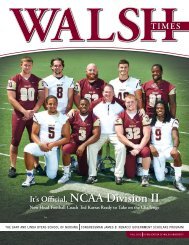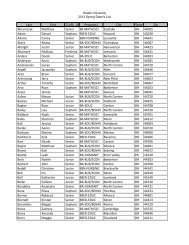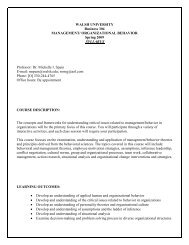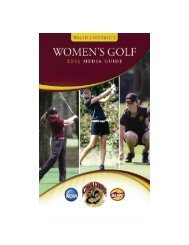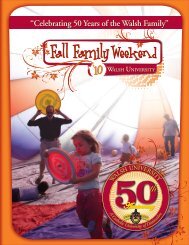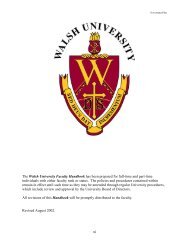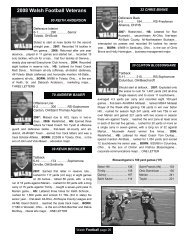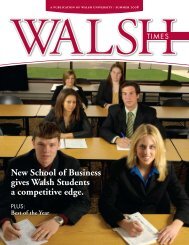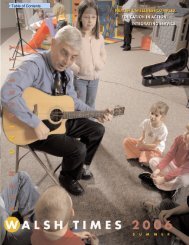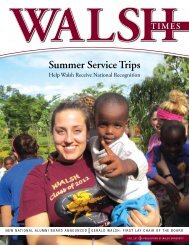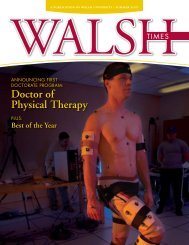Presentation Abstracts and Participant Contact ... - Walsh University
Presentation Abstracts and Participant Contact ... - Walsh University
Presentation Abstracts and Participant Contact ... - Walsh University
You also want an ePaper? Increase the reach of your titles
YUMPU automatically turns print PDFs into web optimized ePapers that Google loves.
<strong>Presentation</strong> <strong>Abstracts</strong> (in the order of their place in the program)Moshe ShnerNihilism Behind the Corner: the end of Jewish history in the 20th century (Thur. Sept. 26 th 08:00 PM)The reality of the Holocaust (The mass destruction of Jewish life during WWII) sheds a dark shadow over our image of humanity. It isa shattering event that m<strong>and</strong>ates a new underst<strong>and</strong>ing of human civilization <strong>and</strong> new answers to the question of being human in a post-Auschwitz reality. For educators it is a huge challenge – how we deal with it in our classes? What are the questions we bring into ourdiscussions <strong>and</strong> what kind of questions we encourage our students to ask?We may ask – following the famous words of Primo Levy – "who is Man?". Who is Man that could cause such evils <strong>and</strong> cruelties toother human beings? Who is Man that was victimized in such brutal ways <strong>and</strong> became a shadow of himself? Who is the ghettodweller? Who is the camp prisoner? Who is the Capo? Who is the Muselmaenner? Who is the survivor of the Holocaust? Who are us,those who live 70 years after <strong>and</strong> look back at it <strong>and</strong> try to underst<strong>and</strong> its meaning to our idea of humanity?Monotheistic faiths – Judaism, Christianity <strong>and</strong> Islam- developed rich traditions of world justice. World history is governed by theGod of Justice <strong>and</strong> Righteousness. Those faiths have a long tradition of theodicy: everything that happens is part of this God-guidedhistory. The Holocaust as a radical historical event stretches this tradition to its limits. Talking with our students about faith after theHolocaust – do we still have faith in faith <strong>and</strong> in world goodness? What we say to our students <strong>and</strong> what we encourage them to say?Jewish-Christian-Islamic civilizations developed the idea of human rationality. People can, <strong>and</strong> therefore should – lead their life in arational way <strong>and</strong> solve their conflicts through rational discourse. Do we still believe in human rationality? Do we authenticallyadvocate rationality in our educational work in a post Holocaust reality? What are our ethical horizons after the Holocaust? Modernthinking developed in recent few hundred years the idea of Pluralism <strong>and</strong> Tolerance. People may have different faith but hum<strong>and</strong>ignity m<strong>and</strong>ates tolerance between all faiths <strong>and</strong> ideologies but the ideology of intolerance. So how we deal in a post-Holocaustworld with ideologies of hate <strong>and</strong> fanaticism?The idea of humanity m<strong>and</strong>ated human solidarity. In Modernity we underst<strong>and</strong> that our planet is small <strong>and</strong> we all depend on one-eachother,but do we really trust this underst<strong>and</strong>ing after the events of the 20th century? Can we seriously <strong>and</strong> trustfully tell our childrenthat they have to take care on one-each-other? We all need the others around us. We cannot survive alone <strong>and</strong> we cannot survive inloneliness, but can we really trust the other or maybe "the other is Hell" (Sartre) <strong>and</strong> we have to arm ourselves up to our neck? Do wetell our students <strong>and</strong> children that the other is good or do we have another idea to share with them – be cautious!
Jewish thinkers have a more severe challenge as it were the Jews who were the ultimate victims of the Holocaust, all destined todisappear from the surface of earth. What is it for them to be a Jew after this horrible event? What is the meaning of having a Jewishhomel<strong>and</strong> state after it? Can we advocate Jewish continuity?These are some of the questions that people aware of history - from all traditions <strong>and</strong> culture – have to deal with if they want to have abetter future.Jack PastorHolocaust <strong>and</strong> History (Fri.. Sept. 27 th 09:00 AM)The academic study of history has undergone two major attacks in the last few decades. On one h<strong>and</strong> the post-Modernist view hasrendered all history as narrative, <strong>and</strong> hence created a situation in which history can be described as simply narratives dependent on theinterpretation of a narrator. On the other h<strong>and</strong> the Holocaust deniers have created an atmosphere of doubt regarding the very existenceof the Holocaust by ostensibly using "historical method" which they in some respects derived from the post-Modernist view that allhistory is only literary narrative. This presentation will discuss the ramifications of the historical method for Holocaust studies.Miriam ShenkarA Case Study of Holocaust Education in Germany (<strong>and</strong> the interactive process involved in the creation of amemorial exhibit <strong>and</strong> educational curriculum (Fri.. Sept. 27th 10:00 AM)“I think my presentation is more focused on the ways in which the German high school students were engaged in an experiential <strong>and</strong>interactive learning process through which a performance based on the book was created. The co author of the chapter was actuallymy mom, who is a Jewish historian, but my training is in international <strong>and</strong> comparative education <strong>and</strong> I teach classes on the
intersection of school <strong>and</strong> society, educational philosophy, creativity in education, <strong>and</strong> other such issues at Ohio State. I think theformat of the conference in terms of discussions <strong>and</strong> shared knowledge would be very useful. “Basilius BawardiThe literary Arabic texts: Towards Humanization of Context (Fri.. Sept. 27 th 11:00 AM)The lecture will focus on whether literary Arabic texts have the power to bring together humans <strong>and</strong> to unite them by the power ofvalues such as love, containment <strong>and</strong> mutual life. Such unification may improve the quality of life <strong>and</strong> contribute to the security ofpeople wherever they live. The lecture will focus on diverse texts of Muhyi al-Din Ibn Arabi (1164-1240), Muhammad Darwish(1941-2008), Adonis (1930) <strong>and</strong> Jibran Khalil Jibran (1883-1931).Nurit Toren – KaplanThe nature of moral development in the context of educational global models – possible model of moral educationin global educational partnerships. (Fri.. Sept. 27 th , 12:00 PM)Children <strong>and</strong> youth anti-social behavior is a major concern among educators, teachers <strong>and</strong> parents all over the world. There are anumber of factors within the home, community, <strong>and</strong> school environment that are related to anti-social behavior. The following globaleducational program, will examine ways to prevent anti-social behavior, by developing positive classroom climate which emphasizesclassroom management as a moral activity.The questions I would like to bring to our global course are related to three levels: On the intrapersonal level, students will bepresented with an opportunity for self-reflection (examine their own ethical <strong>and</strong> moral dilemmas). On the interpersonal level,students will be invited to examine moral principles in the context of culture <strong>and</strong> gender differences. On the educational level,students will be exposed to children's <strong>and</strong> adolescents' moral dilemmas, <strong>and</strong> the importance <strong>and</strong> benefits of discussing moral dilemmasin the classroom. In addition, students will be introduced to various teachers’ behaviors that help or restrict coping with moraldilemmas in class, <strong>and</strong> ways to invite parents for dialogue that facilitates the management of children’s moral development.
Main program goals are: 1) Promoting students' moral development through social <strong>and</strong> emotional learning. 2) Reducing hostility<strong>and</strong> building compassion among children <strong>and</strong> adolescents. 3) Bridging school <strong>and</strong> home environments.What are the dynamics we envision in such a program? The above described global educational program will take part in theteaching training process, we will open a joint website, all the dialogues <strong>and</strong> correspondence will be in English, <strong>and</strong> theory will bestudied in local language. American <strong>and</strong> Israeli students will address their attitudes towards moral dilemmas, focus on moraldilemmas in the classroom <strong>and</strong> share practical ways to manage moral dilemmas in the class from different cultural perspectives.Sharing thoughts, attitudes <strong>and</strong> experience to draw conclusions will be more interesting for our students, will raise their motivation<strong>and</strong> raise their curiosity to underst<strong>and</strong> themselves <strong>and</strong> others around the world. It will create a new view for our students enablingthem to better underst<strong>and</strong> similarities <strong>and</strong> differences in our community/culture. Furthermore, dealing with schools’ moral dilemmaswill expose our students to cultural characteristics <strong>and</strong> moral implications that are reflected in students’ relationships, students- teacherrelationships, family-school relationships, social norms <strong>and</strong> democratic ideals. In addition, participating in this program will giveour students the opportunity to take part in a global educational action research.William DavisConflict Resolution course using Skype <strong>and</strong> Facebook (Fri.. Sept. 27th 2:00 PM)For many provincial US students global politics <strong>and</strong> particularly classes on Conflict Resolution are difficult. Much of the currenteducational literature suggests by that multi-cultural interaction is a powerful learning tool. This proposal outlines the establishment ofa technically-mediated, visual platform, where students, who are physically situated in two geographically distant communities,interact using strategies that improve established student learning outcomes (SLO’s). The project seeks to determine through surveydata <strong>and</strong> empirical tests if US <strong>and</strong> Israeli students who interact with their global peers will identify with them <strong>and</strong> better achieveSLO’s."Itzik GonenListening without Agreement: An intergroup dialogue in a bi-national class (Fri.. Sept. 27 th , 03:00 PM)
In our classes we find ourselves dealing with feelings of anger, hate, blame, misery, hostility, etc. Many time these feelings derivefrom the fact that the students represent different cultures <strong>and</strong> history (white/black etc.), different religious (Christian/Jewish/Moslemetc.), different socioeconomic status (rich/poor etc.), or different nationality (Israeli Jew/Israeli Arab etc.). What can we do about it?No doubt we have to have some kind of a dialogue in order to underst<strong>and</strong> each other better, but many times it's not easy to initiatesuch dialogue <strong>and</strong> to ensure sincerity, openness <strong>and</strong> trust.The presentation <strong>and</strong> the following discussion will take the Israeli-Arab dialogue as an a example, <strong>and</strong> will ask questions regardingany conflict of cultures: what can we do in order to find better ways to promote a fruitful dialogue, including a virtual one.Moderator: Rabbi John Spitzer, Panel participants - Jewish Perspective: Rabbi Joan Friedman; ChristianPerspective: Chris Seeman; Muslim Perspective: Zeki SaritoprakShabbat Service (Sat. Sept. 28 th 09:00 – 09:30 AM)“Faith <strong>and</strong> Dialogue” (Sat. Sept. 28 th 09:30 – 11:30 AM)In a world in which conflict between cultures <strong>and</strong> faith is all too frequent, is it possible for people of diverse religious <strong>and</strong> culturalbackgrounds to discover, in their texts <strong>and</strong> traditions, values which authentically bridge differences <strong>and</strong> generate meaningful dialogue?Rachel Ravid (Sat. Sept. 28 th 12:00 PM-1:50 PM)Following this presentation, participating faculty in the course Jeannie DeFazio <strong>and</strong> Laurie Katz will be joined by Smadar Dolevthrough videoconferencing technology to discuss their findings.Inclusion in Early childhood education: Practices <strong>and</strong> Experiences from the perspectives of American & Israeli Cultures aslearned in a joined online course (Oranim Coll. - Ohio State Uni. 2012-2013)Traditionally, children with Special Education Needs (SEN) were provided specialized services in segregated settings that focused ona medical model to address children’s particular impairments. Children receiving specialized services were considered “ready” to bepart of the general education classroom when their skill level matched those of their peers (UNICEF 2012). However, over the past 20
years the shift towards including children with SEN in general education classrooms has been strengthened, heightening the need toensure the right for equal education to all.Inclusion has become a global agenda underpinned by several international conventions <strong>and</strong> statements such as the SalamancaStatement <strong>and</strong> Framework for Action in Special Needs Education (1994), which required participant nations to ensure that all theireducational policies instruct that children with SEN attend the educational settings within their natural community (UNESCO, 1994).Overall, inclusive education, then, as an educational reform is utilized in wider contexts as a key driver for promoting socialintegration <strong>and</strong> cohesion in societies that are progressively diverse socially <strong>and</strong> culturally (Armstrong et al. 2010).In this proposal inclusion is defined as a dynamic process based on four philosophical grounds (Jones, 2004): 1) a principle promotingthe ethos of valuing diversity; 2) an end product of a non-segregated early- age education; 3) quality of educational provisions forchildren with or without special needs; <strong>and</strong> 4) a broader st<strong>and</strong>point viewing inclusion as a social movement <strong>and</strong> reform. Thus, themain drive for including children with SEN within general education settings is justice-oriented, driven by the concern that children’srights would be compromised by segregated special education (Lindsay 2007). However, above all, inclusion signifies the educationof all children within their communities, <strong>and</strong> implies the need for these settings to consider their structures, teaching philosophies <strong>and</strong>approaches <strong>and</strong> the use of support <strong>and</strong> guidance in order to better respond to the needs of all children attending the setting (Cole 2005;Runswick- Cole 2011).Three main interrelating principles have been recognized as linking to the development of inclusive practice. The first principleexp<strong>and</strong>s on teachers’ underst<strong>and</strong>ings that high- quality education involves responding to human differences in ways that include ratherthan excluding children within educational environment. The second principle extends teachers pedagogical ability to allow allchildren access to one- shared curriculum. And the third principle involves a shift in thinking about teaching <strong>and</strong> learningacknowledged <strong>and</strong> enhanced, stressing the need to design lessons <strong>and</strong> learning opportunities that enable the participation of allchildren (Florian et al. 2010). Consequently there is a need to design teacher preparation programs that focus on addressing teacherattitudes towards inclusion, <strong>and</strong> to support teachers in differentiating the curriculum to meet the needs of all children, specificallystudents with special education needs (Florian & Hopewell 2006). Based upon this rational along with the importance of learning tobe part of a global society, a pilot global course with an evaluative research study was designed <strong>and</strong> currently being implement inteacher preparation programs across two nations: the United States <strong>and</strong> Israel.The global trainee teachers’ course introduces a pedagogical framework for including children with SEN in general education settings(birth to grade 3). The course is taught in a blended learning environment, which includes face-to-face <strong>and</strong> online instruction betweenAmerican <strong>and</strong> Israeli students. Students participating in this course are students preparing to be teachers or who are already practicing
teachers. The aims of the course are: First, address students’ attitudes towards inclusive education which are considered an importantpart of teachers’ implementing inclusive practices. Teachers who don’t view their role as promoting the development of SEN childrenin their classrooms are apt to share their attitudes with their students in implicit manners with the potential to hinder the social <strong>and</strong>academic performance of all children. Second, to address theoretical <strong>and</strong> practical knowledge about inclusion from different culturalperspectives- based upon students’ personal <strong>and</strong> professional experiences.This cross – cultural project: course <strong>and</strong> research, is made available through the development of communication technologies thathave transformed modern underst<strong>and</strong>ings of time <strong>and</strong> place as people increasingly have immediate access to events that are occurringon the other side of the globe (Artiles & Dyson 2005) .Gary Jacobs, Rodney Blunck <strong>and</strong> Itzik GonenLeadership Development across the Globe (Saturday Sept. 28 th , 2:00-2:50 PM)Beginning in October 2013, this course focuses on the various leadership models <strong>and</strong> allows students to discover the type ofleadership skills they need to become transformational leaders in their administrative positions. Students will be assessed through selfassessment,<strong>and</strong> one on one with faculty, to identify the leadership skills administrators need to enrich or develop to becomesuccessful transformational leaders. Students will work collaboratively with faculty from <strong>Walsh</strong> <strong>University</strong>, <strong>University</strong> of Colorado–Denver, <strong>and</strong> Oranim College in Israel <strong>and</strong> additional students from each of the participating GLP institutions to develop <strong>and</strong>implement projects related to leadership development.Moshe ShnerThe Book Sharing Project as a model of Global Learning program in a Post-Holocaust Era (Sun. Sept. 29 th , 09:30 AM)About 17 years ago the Ghetto Fighters House Holocaust <strong>and</strong> Heroism Museum in Israel initiated a pioneering global educationprogram, called "The Book Sharing Project" (1996-2012).
The program addressed questions of Holocaust education <strong>and</strong> humanism in a post-Holocaust era through joint literature reading <strong>and</strong>online discussions. In a short time it developed into a worldwide educational program <strong>and</strong> reached hundreds of schools <strong>and</strong> thous<strong>and</strong>sof students in Israel <strong>and</strong> the US.The first phase of the program was based on literature for junior high school students <strong>and</strong> got the name "Children of the World learnabout Children". The second stage of the program was aimed to senior high school students based on the books of Elie Wiesel. In itspick the program was hosted in a bilingual (Hebrew <strong>and</strong> English) online Janusz Korczak school, with school loby (registration pages),classrooms (forums), history resources library for the students, teachers rooms, students art gallery, pedagogical resource center forteachers <strong>and</strong> more. Teachers training seminars were offered in Israel <strong>and</strong> the US.Following its success <strong>and</strong> quick growth the program stumbled upon many difficulties: pedagogical management, different schoolculture, teachers training, proper use of technology <strong>and</strong> financial issues. Like Icaros in the Greek mythology who flew too high <strong>and</strong>crashed down so this program had to be closed down after 15 years of inspiring educational operation.In principal we ask can we develop this program into new directions <strong>and</strong> can we develop other models of global learning that dealwith the critical human questions? And what is our missing piece in this model that in spite of its great success caused its closure?What we should do better in structuring <strong>and</strong> managing such global programs that will make them more sustainable?<strong>Participant</strong>s contact informationName Academic Affiliation E-mail PhoneMoshe Shner Ph.D.Oranim Academic CollegeJewish Philosophy DepartmentMoshe_s@oranim.ac.il /mosheshner@gmail.com972-(0)54-4993895Itzik Gonen Ph.D.Oranim Academic CollegeHead of M.Ed. Program for EducationalLeadership,The Faculty of Graduate StudiesItzik_g@oranim.ac.il 972-(0)52-2943303Basilius Bawardi Ph.D. Oranim Academic College basilius_b@oranim.ac.il 972-(0)54-4543716
Nurit Toren – KaplanPh.D.Rachel RavidJack Pastor Ph.D.Head of M.Ed. Languages Dep./ ArabicLiteratureOranim Academic CollegeM.Ed. - Educational CounselingOranim Academic CollegeEarly Childhood EducationOranim Academic CollegeDean of Humanities & Social SciencesFacultynurit_kt@oranim.ac.ilRachel_r@oranim.ac.il 972-(0)54-2579464Jack_p@oranim.ac.il 972-(0)507954223Miriam Shenkar Ph.D. Ohio State <strong>University</strong> shenkar.2@osu.eduWilliam Davis Ph.D. <strong>Walsh</strong> <strong>University</strong> wdavis@walsh.eduRabbi Johan SpitzerPh.D.<strong>Walsh</strong> <strong>University</strong>jspitzer@walsh.eduRita Schaner Ph.D. <strong>Walsh</strong> university rschaner@walsh.edu 330-327-3890



